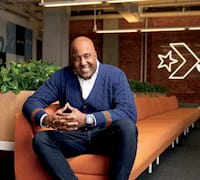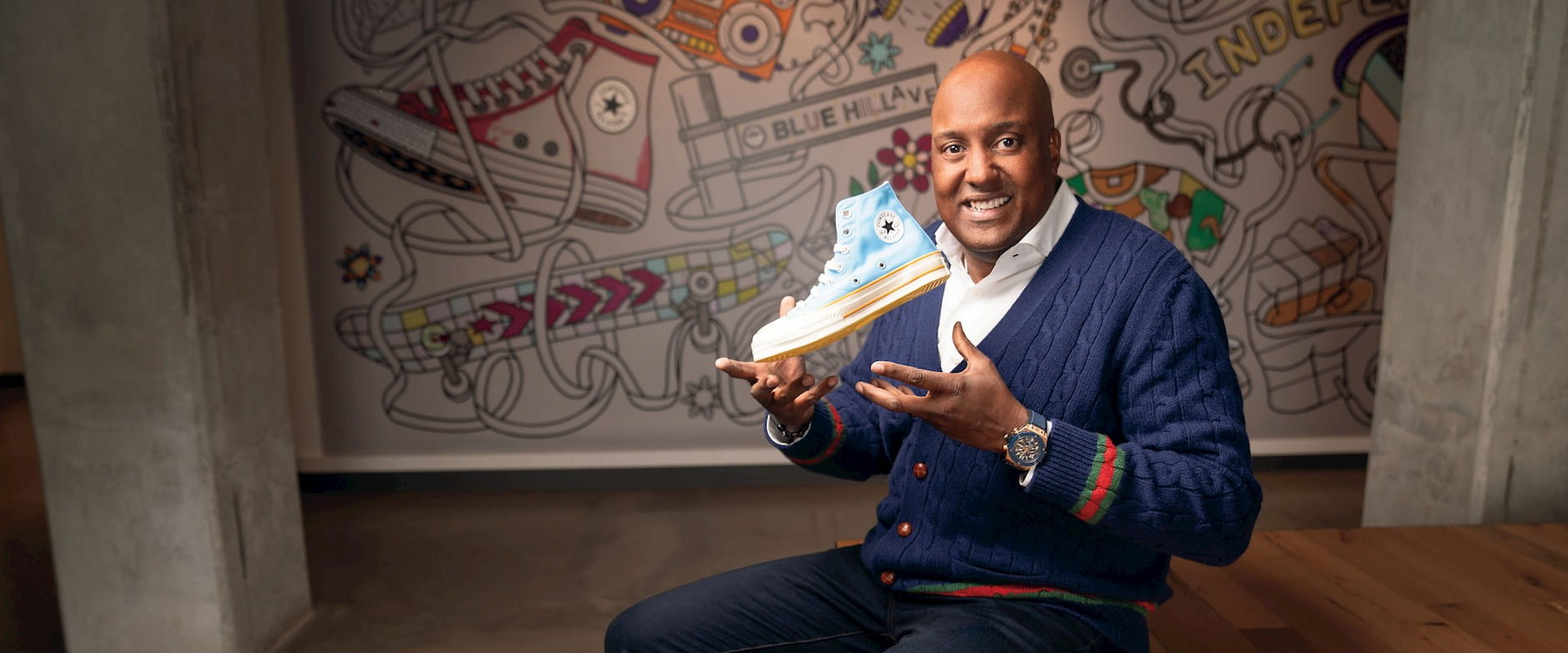When G. Scott Uzzell, ’98, was offered the job as president and CEO of Converse in 2019, he sat down to make a one-page list of the pros and cons of moving to the new role or staying at the Coca-Cola Company, where he was head of the venturing & emerging brands (VEB) group. He methodically analyzed how the decision might affect his career and his family.
Then he tossed the list aside.
Instead, Uzzell let himself be guided by three questions that had helped him through previous transitions: Am I going to learn something? Will I be passionate about this job? Will it be fun? The answer to all three questions was yes. Uzzell told Converse: “I’m all in.”
“I spent too many years trying to plan out the perfect career path,” Uzzell says. “Now I’m more intentional about trusting myself. It’s like skiing—it’s much more fun to try to feel the mountain instead of just following a set of instructions. It’s like playing with joy.”
Uzzell has brought that same emphasis on authenticity to Converse, a brand that relies on making genuine connections with 16-to-24-year-old customers who will quickly suss out any hint of insincerity. The approach has paid off, with revenue increasing 6 percent to $2.3 billion in the fiscal year 2022 at Converse, a subsidiary of Nike.
Converse has been selling a version of its iconic All Star athletic shoes since the early 20th century. The name Chuck Taylor was added to the style to honor a company salesman and semipro basketball player whose suggestions elevated the shoes’ performance. Converse shoes have been worn by Olympic athletes and on NBA courts by players such as Larry Bird and Magic Johnson.
Today, the brand has to keep the attention of young consumers by constantly updating its styles. Recent innovations include the Chuck 70 rendered in crushed velvet sourced from vintage dresses; the Run Star Hike, a platform sneaker; and the CX FlyEase, which incorporates Nike technology that lets users put on their shoes hands-free, increasing accessibility for people with limited mobility.
One way that Converse gets a gut check on its designs and marketing is through conversations with its All Stars Community, a group of about 3,000 young people worldwide considered microinfluencers—users who count their social media followers in the thousands rather than the millions but have an outsize impact on their communities.
“You wouldn’t necessarily know many of them, unless you live near them in Johannesburg or Shanghai or Chicago,” Uzzell says. “Creativity drives them, and they express themselves through music, art, fashion, and sport. We support what they do through product, and they help us shape the brand to make sure we’re connected with the culture.” On a recent Zoom call, the All Stars gave Converse feedback on ideas for an upcoming marketing campaign.
Internally, Converse has five employee networks, collectively known as Converse United, that raise the perspectives and voices of women, disabled people, military veterans, LGBTQIA+ individuals, and Black, brown, and Asian employees, while giving them internal support and the opportunity to make a difference in the greater community. Converse has a group of about 20 Black, brown, Asian, and LGBTQIA+ employees who make up its Creative Council, advising the brand on its storytelling. Members of its employee networks give advice on community investments for social impact.
Building a diverse and inclusive corporate environment has been a priority for Uzzell.
“You can have a bunch of folks in the room studying someone else’s culture to try to make sure the brand you work on is authentic,” Uzzell says. “Or you can have people who are already part of the culture doing that work.”

“I spent too many years trying to plan out the perfect career path. Now I'm more intentional about trusting myself.”
— G. Scott Uzzell
Uzzell began to recognize the importance of culture as a Booth student, where he took a class on mergers and acquisitions with former professor Toby E. Stuart (now at the University of California at Berkeley). Uzzell had read about buying and selling companies in the Wall Street Journal, but the stories were always about strategy and dealmaking. Stuart urged the students to consider that when mergers and acquisitions fail, culture is usually to blame. More than a decade later, Uzzell remembered that lesson as president of Coca-Cola’s VEB group when he evaluated a potential acquisition that looked great on paper but raised red flags in terms of company culture. He chose to walk away.
At Booth, Uzzell soaked up the case studies, which showed him how to analyze a wide range of business environments and problems. “You would need 40 years of business experience in real life to encounter so many different issues,” he says. “It was like being a baseball player and getting to see a curveball, a slider, a fastball—you get to see a lot of different looks in two years.”
Business school also led Uzzell to reflect on the pitfalls of his earlier business ventures. His father was an entrepreneur, the owner of a sheet-metal company in Washington, DC that manufactured parts for aircraft carriers. Inspired by his example, in high school Uzzell started a telephone company, capitalizing on the deregulation of the industry in the 1980s. He imported products and recruited students to sell phones to their friends and family. As the business grew, Uzzell began picturing himself on magazine covers. He was skipping soccer and tennis practice, and holding meetings at school against the rules.
Then his phones started to break. Having personally guaranteed his products, Uzzell was writing refund checks that soon exceeded his revenue. His parents had to bail him out, and the experiment was over.
“There was a lot around the business aspects that I didn’t understand,” he says. “It taught me that I had a lot to learn.”
After high school, Uzzell attended Florida A&M University, where he met his wife, Sunda. An internship with Procter & Gamble in Oak Brook, Illinois, led him to spend a summer living at the International House at the University of Chicago. He loved meeting students from around the world and dreamed of studying at the university—a goal he achieved just a few years later, when Nabisco Biscuit Company, his employer at the time, agreed to pay for his Booth MBA.
Uzzell strengthened his quantitative skills in business school and drew inspiration from meeting with company founders and CEOs such as James M. Kilts, ’74, who led Gillette and negotiated its sale to P&G. As Uzzell completed his MBA, “my aperture opened wider and wider,” he says. “I had no boundaries for what I thought I could achieve.”
He climbed the ranks at Coca-Cola, becoming president and general manager of the beverage company’s VEB group. Uzzell’s curiosity about people and products and his innovative thinking helped him create bridges between entrepreneurs and corporate executives, says Jerry S. Wilson, Coca-Cola’s former senior vice president and chief customer and commercial officer.
“He spent a lot of time doing deep dives into different categories,” Wilson recalls. “That was very important, because Coke has a tendency toward big products, and truckloads and warehouses full of beverages. In order to win in emerging brands, you’ve really got to understand not only the category, but what drives the entrepreneur behind the big idea.”
Kellam Mattie, who was Uzzell’s CMO for emerging brands, notes his ability to inspire and lead people who didn’t report to him directly, such as those employed by brands receiving Coca-Cola investments. One of his favorite events, she recalls, was an annual summit that brought entrepreneurs, agency representatives, and motivational coaches to Coca-Cola headquarters in Atlanta for a daylong learning event.
“People want to naturally follow him,” Mattie says. “He is very interested in other people, in learning and growing, so that he almost becomes the student in any new relationship.”
With growing confidence in his abilities, Uzzell began making bigger leaps. He left Coca-Cola in 2012 to be president and chief commercial offer of ZICO Beverages, a coconut-water company in El Segundo, California, that Coca-Cola acquired in 2013. A year and a half later, he returned to Coca-Cola’s Atlanta headquarters to run its VEB business.
“He's an authentic person. He's a caring person. He wants to do what's right. And he's committed to a principle-based leadership model.”
— Jerry S. Wilson
When Nike recruited Uzzell to run Converse, the shoe brand was just beginning to rebound after several years of declining sales. Uzzell had been in the job for little more than a year when COVID-19 began disrupting supply chains and forcing retail stores to close in early 2020.
The pandemic showed Uzzell the benefits of being transparent with his employees. “I had to become comfortable in saying, ‘This is the best plan we have, when the world is shutting down. We’re just going to have to be flexible and revamp when we learn more,’” he recalls of that time. Three years later, he recognizes that demonstrating his own vulnerability as a leader helped his employees “remove the veneer” and be their authentic selves at work.
Uzzell’s leadership style is well suited to this moment, Wilson says: “He’s an authentic person. He’s a caring person. He wants to do what’s right. And he’s committed to a principle-based leadership model. That means that he’s willing to do the hard work to get the right results in a manner that is consistent with the values of the company.”
After the murder of George Floyd in May 2020, Uzzell released a statement amplifying Converse’s longstanding commitment to social justice. “What is abruptly and painfully clear, is that there cannot be youth progress, without Black progress,” he wrote. “All lives cannot matter, until Black Lives Matter.”
As part of his statement, Uzzell made a number of commitments for himself and the brand, including increasing opportunity and equity for Black employees at Converse. He has asked employees to hold him accountable when they feel the company falls short of creating an inclusive workplace.
The brand also promised in 2020 to support US voter access, including education and registration for its employees, and to work with Nike and the Jordan Brand and Michael Jordan to invest a total of $140 million over 10 years to support Black communities, focusing on organizations that advocate for social justice, improve education, and fight racial inequality. Converse has worked with community partners in its hometown of Boston such as the Possible Zone, which helps young people develop entrepreneurial skills; the BASE, which provides sports programming as well as academic and career resources; and Embrace Boston, which aims to dismantle structural racism through its work in art, culture, research, and policy.
In 2023, to honor Black History Month in February, Converse released its Black Joy collection of clothing, Chuck Taylors, and other shoes with earth tones and camouflage prints that celebrate nature and the outdoors, conceptualized by Black employees.
“Celebrating Black Joy is celebrating not only the contribution that Black people and African Americans have made to history, but also being proud of who we are today,” Uzzell says.

“Celebrating Black Joy is celebrating not only the contribution that Black people and African Americans have made to history, but also being proud of who we are today.”
— G. Scott Uzzell
As he focuses on responsibilities such as building a culture where all employees can thrive, Uzzell has let go of smaller issues. In a decision-making class at Booth, he learned that leaders with wide-ranging duties have to choose when to analyze a decision in great detail and when to review it at a higher level to avoid slowing down the entire enterprise. Uzzell understood the suggestion in theory, but it took years for him to put it into practice.
“Now I’m spending more time identifying the 15 percent of business problems that really need the rigor, while allowing the other 85 percent to move along through skillful shaping of questions,” he says. Earlier in his career, “I did not follow that lesson, because I could still get my arms around everything, and I wanted to be a perfectionist. I got to a point in my coaching and feedback where I heard that was not good for my team.”
Empowering employees has reduced bottlenecks and allowed Uzzell to focus on key areas, such as building the right team and developing strategy. He also carefully considers the trade-offs that must be made to keep the company moving in the right direction. Though he maintains an open-door policy, when an employee casually approaches him with an idea, he has to be careful not to encourage a suggestion that could distract people from reaching their most important goals.
“By saying yes, you can change a lot of people’s worlds,” Uzzell explains, “but you don’t have the resources to say yes to everyone. You have to say no to 70 percent of the things that come in front of you. Otherwise, you’re creating chaos, confusion, and ultimately dejection because you can’t do it all.”
Maybe Uzzell can’t do it all, but it still takes a lot of energy to keep up with him as he wears out his Chuck 70 black high-top sneakers. On top of a packed work and travel schedule, he spends his weekends skiing, cycling, and playing golf and basketball. He and Sunda have raised a son, Tanner, and a daughter, Sawyer. He’s having the most fun of his career, and when he talks to students today, he counsels them to develop the confidence to make their own authentic choices.
“Half of life,” he says, “is going through the door and reaching the point where you can’t see where you came from, and you don’t know where you’re going. You have to trust that you’re going the right way.”


